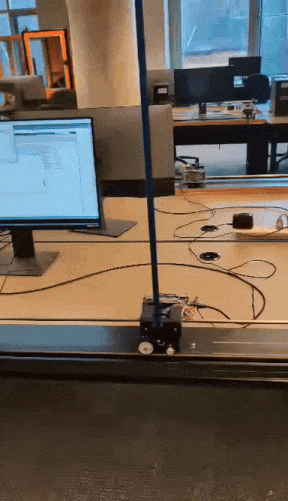Inverted Pendulum Stabilization - ECE410

The highlight of my ECE 410 course was the hands-on implementation of advanced control theory through the Inverted Pendulum project. This ambitious endeavor not only reinforced my theoretical understanding of robotics control but also showcased my ability to apply this knowledge to real-world challenges.
- Theoretical Mastery:
-
Acquired in-depth knowledge in advanced control concepts, including Kalman decomposition, PID, LQR, MPC, state feedback stabilization, optimal control, and integral control.
-
Applied these theoretical foundations specifically to the challenging dynamics of stabilizing an inverted pendulum on a moving cart.
-
- Practical Application:
-
Utilized MATLAB and Simulink to model and simulate various control algorithms for the inverted pendulum system.
-
Translated theoretical models into practical solutions, emphasizing the complexities of real-world dynamics.
-
- Hardware-Software Integration:
-
Implemented controllers on an Arduino board.
-
Overcame the challenges of real-time control, validating the effectiveness of theoretical control strategies in a physical environment.
-
Significance of the Inverted Pendulum Project:
- Demonstrated Application of Theory:
-
The project served as a tangible demonstration of how advanced control theories can be applied to solve complex real-world problems.
-
Successfully stabilizing the inverted pendulum highlighted the practical implications of theoretical concepts in robotics control.
-
Gained first hand experience in the difference between simulated performance, and real performance with disturbances.
-
- Skill Development:
-
Developed a unique skill set in designing, simulating, and implementing control strategies specifically tailored for challenging systems like the inverted pendulum.
-
Gained proficiency in troubleshooting and fine-tuning controllers for dynamic physical systems.
-
The Inverted Pendulum project in ECE 410 stands out as a pivotal experience, underscoring the practical application of advanced control theories. This project not only solidified my understanding of robotics control but also demonstrated my capacity to tackle complex challenges at the intersection of theory and application. As I move forward, the lessons learned from this project will undoubtedly shape my contributions to the field of robotics and automation.